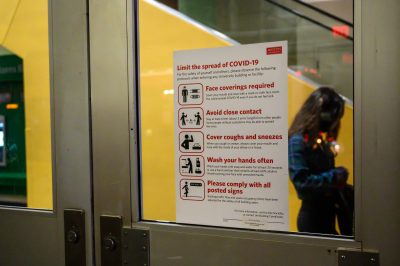As classes officially began on Wednesday, many students and professors made the trek across campus for in-person courses. Through the Learn from Anywhere model, students are given a choice to attend class virtually or on campus, but most professors do not have this option.

In an open letter to Boston University and the Dean of the School of Public Health, SPH professor Michael Siegel outlined his concerns that the school’s current policies protect health and safety. The letter was uploaded to the blog “With All Due Caution,” run by associate philosophy professor Daniel Star, which publishes University-related affairs and criticism from its community members.
Siegel wrote in the post, which was published Monday, that BU should “transition immediately to online-only classes” in an effort to minimize the risks that in-person interaction pose.
He said in an interview that the University’s early commitment to the hybrid model does not honor several health guidelines that SPH imposes and stands for.
“We don’t just teach students the principles of public health, but we should be modeling this ourselves to our students,” Siegel said. “The reason I wrote this letter was because I’m concerned that we’re not doing that.”
Those health principles, Siegel said, include protecting all community members regardless of vulnerability and leading with empathy rather than financial motives. While other public health institutions in Boston — such as Harvard University and Tufts University — decided to maintain completely remote learning, BU opted for a hybrid version. Siegel said he believes the move was purely for financial gain.
“There’s no educational benefit of hybrid classes and there’s no health benefit,” Siegel said. “The only explanation for this is financial, and while that may be okay for the University, at the School of Public Health, one of our principles is that we don’t put money above the health of the public.”
Siegel, who will teach two courses this Fall, received a workplace adjustment that allows him to teach remotely for the semester. To receive such an accommodation, faculty had to be considered high-risk under U.S. Centers for Disease Control guidance and provide a note from their doctor.
But many of his colleagues were unable to obtain this flexibility, and Siegel said they’ve vocalized their dread about entering campus spaces during this health crisis.
“I know a large number of faculty who just didn’t meet the criteria to get workplace adjustments, but they are scared,” Siegel said. “They are literally having [a] huge amount of anxiety about going into the classroom. They’re really, really worried and they’re literally fearing for their lives.”
Star was among the professors who obtained authorization to hold all classes via Zoom. He said he began his blog after authoring an open letter to University leaders in early June on the harm a hybrid learning model would force on professors. The message led to a petition, which has garnered around 1,600 signatures as of Wednesday but, according to Star, has yet to be acknowledged by BU administration.
While virtual classrooms are not ideal, Star said they are the best option during a pandemic and that both professors and students will feel safer and less restricted.
“Having a class totally online is better,” Star said. “It will be much more relaxing, there’ll be less risk involved and we won’t put our old professor at risk.’”
One major issue Star said he has with LfA is wide-scale miscommunication regarding logistical issues, calling it a “big organizational problem” that has not yet seen a solution.
“So many people requested to have rooms changed because they weren’t appropriate for their classes and appropriate given ventilation problems,” Star said, “and the University also suddenly became aware of all these problems with the ventilation and how [COVID-19] might spread because of bad ventilation.”
Earth and Environment professor Nathan Phillips won’t need a room assignment this semester — he is able to teach his two in-person courses outdoors on campus. Phillips had previously expressed his dissatisfaction with BU’s mask policy on “With All Due Caution,” prompting him to seek options that will minimize his concerns.
“I just decided that that’s the way I’m going to teach, so it does include being on campus, it does include face-to-face interaction with students who decide they want that interaction,” Phillips said. “To me, that fulfills my job as a teacher.”
Because he has the ability to teach students without physical barriers, Phillips said he generally approves of LfA but supports Star’s petition to grant professors autonomy regarding how they will conduct class.
But the dangers that come with a hybrid model, Siegel said, can be highly consequential for the most vulnerable groups of people. Many medical conditions that lead to increased risk of severe COVID-19 symptoms are more common among certain racial groups, he said.
“Things like diabetes, high blood pressure, asthma, sickle cell anemia are all much more prevalent among people of color, especially people who are Black, than among people who are white,” Siegel said. “In other words, we’re dividing our classrooms into two separate but not equal sectors, which is based on race.”
























































































































